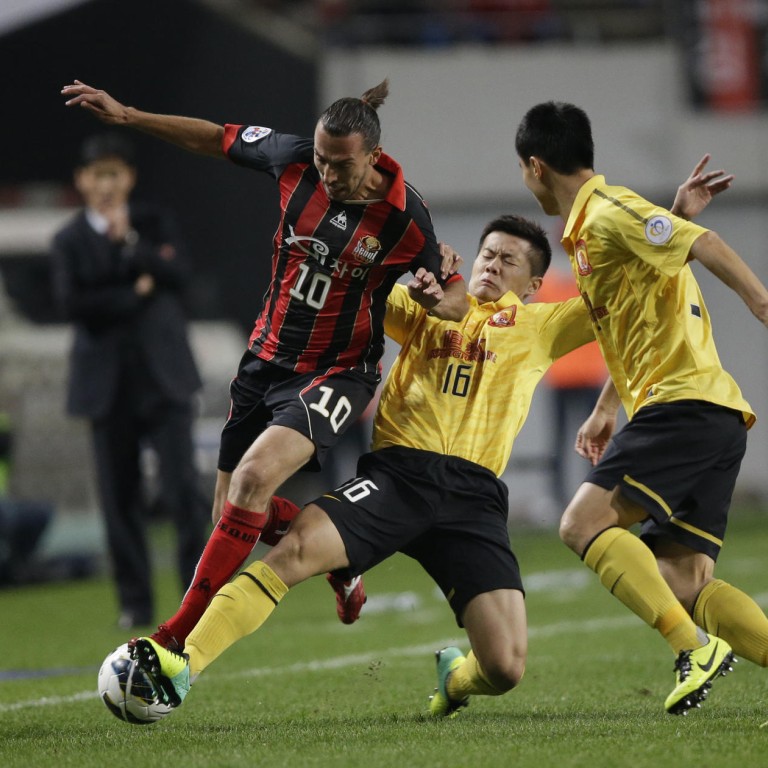
Big-spending China clubs raid K-League for talent
Top players from South Korea have already signed with leading Super League sides and more are expected to head for the mainland
When cashed-up Guangzhou Evergrande defeated FC Seoul in the Asian Champions League final in November, it was no great surprise to anyone.
With the new East Asian season approaching, Seoul and other South Korean clubs are dealing with a different kind of challenge from the Chinese Super League - it seems that barely a day goes by without a player from the K-League being linked to a move across the Yellow Sea.
Chinese clubs seem to have started raiding the ranks of South Korean football, Asia's most successful league in terms of continental club titles.
Last week, Seoul captain and Korean international Ha Dae-sung joined Beijing Guoan in a multimillion-dollar contract. Teammates including Sergio Escudero, Park Joo-young and Mauricio Molina have also been linked to Chinese clubs.
The biggest move of the offseason so far, however, has been that of Dejan Damjanovic. The Montenegrin striker, who scored the goals that got FC Seoul to the ACL decider, signed for Chinese club Jiangsu Sainty in December for a fee of over US$4 million. He was the top scorer in the K-League over the past three seasons.
There are exciting things happening in China at the moment. There is a lot of money in the game there and players have to do what is best for them
"It was hard to leave Korea but I had seven great years and it was time for a change and a new challenge," Damjanovic said. "There are exciting things happening in China at the moment. There is a lot of money in the game there and players have to do what is best for them."
It's not just Seoul that have been targeted. In the last week of last year and the first week of this year alone, Jeonbuk Motors saw defender Lim You-hwan sign for Shanghai Shenxin and then rejected a US$1.5 million bid for Belgian striker Kevin Oris from Shanghai East Asia, though the deal could still happen. Incheon United's Son Dae-ho is expected to finalise a move to Hangzhou Greentown and Seongnam striker Kim Dong-sub has been attracting interest from Chinese clubs.
More are expected to follow from the K-League. And there are also Korean players heading to China from Japan's J-League. On Sunday, Guangzhou R&F announced the signing of South Korean international Jang Hyun-soo from FC Tokyo.
The bigger Chinese clubs have benefited from some major corporate investment in recent years. The best-known are Guangzhou Evergrande, who have spent more than US$80 million since 2010. Headed by 2006 World Cup-winning coach Marcello Lippi, the team have won the past three Chinese league titles and added the continental crown in 2013.
Shanghai Shenhua famously signed Didier Drogba and Nicolas Anelka in a troubled 2012 season while other teams such as Beijing, Shandong and Jiangsu are trying to compete with Guangzhou. Such signings could see the Chinese Super League increasingly upset the balance of power in East Asia, where Japan and South Korea competitions have long flourished.
"While there are some good teams in China like Guangzhou and Beijing who can challenge Korean teams, overall the standard in Korea is still higher," Damjanovic said. "Korea produces lots of good players and that is why Chinese clubs are interested."
Despite Guangzhou's success, even football followers in China admit that the general level in the domestic Super League does not match its eastern counterpart. At least, not yet.
"I don't think this will help the Chinese Super League overtake the K-League," said Chen Zhongjie, editor of leading Chinese sports site Hupu. "As we saw in 2013, it was difficult for Chinese clubs to beat K-League clubs and in total, they won only once out of 12 Asian Champions League games. Local players in China are still not good enough."
According to Chen, rather than an attempt by the Chinese Super League for regional dominance, it is more of a low-risk transfer policy.
"Foreign players in China always find it difficult to adapt to Chinese culture. If a player can adapt to the K-League then there's a bigger chance he can adapt to China. They know the East Asian way ... also they know about Chinese football and some of them have even played against Chinese teams in the AFC Champions League and that means Chinese teams know the players well, too."
South Korea is still growing accustomed to the rise of the Chinese league. Apart from the trickle of stars to the big European leagues, the K-League has long sent players to Japan. In recent times, a greater number of talented youngsters have headed to the J.League in order to avoid the domestic military draft system.
Japan's technical football is usually seen as a healthy education for Korean players and rarely does a club stand in the way of a move to Europe, but China is slightly different.
"It is a little early to say what this means for the K-League," said Park Yong-soo, the head of the Korea Football Association's International Committee. "At the moment, the Chinese Super League is improving and the clubs are spending money and Korean teams can't compete with that.
"The main issue is whether they are going to play in a league that is stronger than Korea which would benefit the game here, too. It is not a problem to see Korean players go to the English Premier League or the Bundesliga but with China, we have to wait and see. We welcome players moving overseas but for the sake of Korean soccer, we want them to go and play at a higher level whenever possible."
